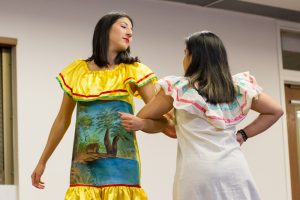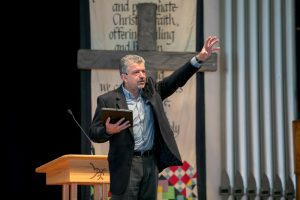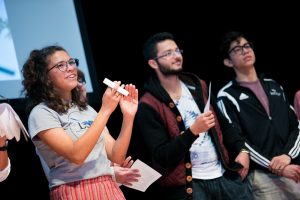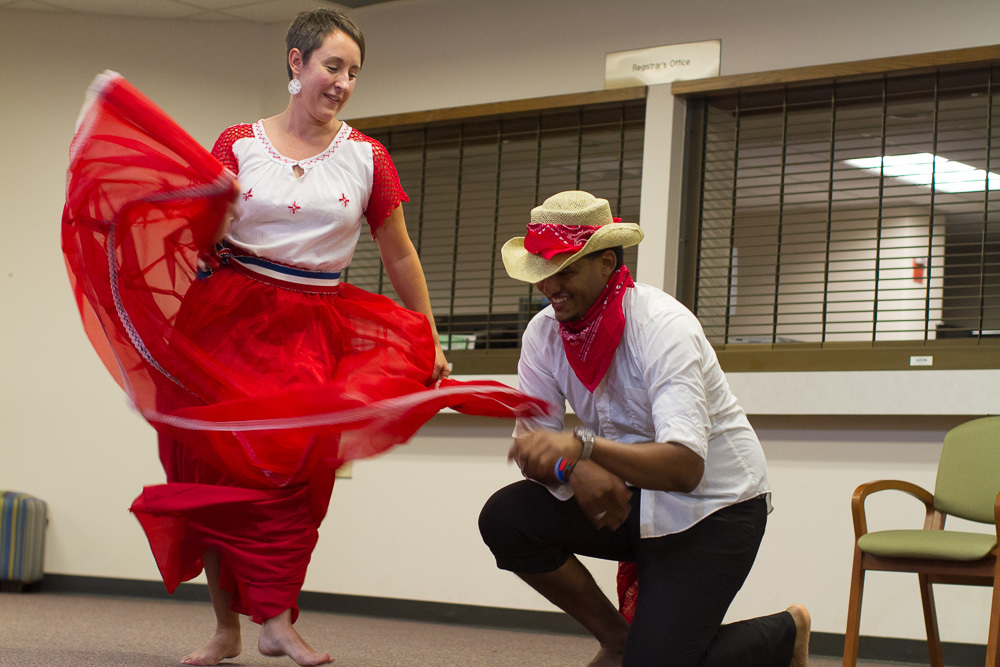The Latino Student Alliance’s annual banquet, a delicious culinary and cultural expedition, marked the near-conclusion of Eastern Mennonite University’s Latino Heritage Month celebration. Six events beginning in mid-September provided the campus community opportunities for learning, engagement, worship, musical celebrations and of course, dancing and sharing food together.
Only the LSA reunion remains. This event is in University Commons 211 from 1:45-3 p.m. on Saturday, Oct. 13, during EMU’s Homecoming and Family Weekend. (LSA is also active throughout the year; stay tuned for their fourth annual popular Easter-time alfombra creation and worship service. Read more here and follow club activities on Facebook.)

On Friday evening, approximately 190 guests enjoyed savory food prepared by local restaurants Las Chamas, Pollo A La Brasa, El Milagro and El Charro.
LSA officers Ariel Barbosa and Fred Flores-Cano mc’ed the event, which included speakers Keyri Lopez-Godoy ’17 and Andrew Suderman, professor of theology, peace and mission who spent 10 years living in Costa Rica, Bolivia and Colombia, as well as reflections from students who had traveled on relevant cross-culturals.
The Jazz Combo and Jazz Ensemble, led by Kaleb Branner and Bob Curry respectively, provided musical interludes, and two dances were performed: a Bolivian folk dance called “Taquirari” by Maria René Saucedo and Rachel Loyer and the merengue dominicano by nursing professor Laura Yoder and Otoniel Suero Escalante.
Fuller professor speaks

LSA also hosted Fuller Theological Seminary professor Juan Martínez earlier this month for a series of talks, including a worship service at Eastern Mennonite Seminary, a convocation address in Lehman Auditorium, and an evening event, open to the public, with students in Professor Adriana Rojas’ 400-level Spanish course that engages with the theme of marginalized voices.
Martínez shared a historical perspective that challenged the American narrative regarding the annexation of northern Mexico and then recounted his own experiences with discrimination in the education system and racial profiling, Rojas said in an email. He went on to discuss immigration and deportation, specifically addressing “ways to advocate for immigrants and continue conversations with people that support border walls and deportation.”
“Dr. Martinez stressed that, instead of debating values and morals or resorting to tribalism, our narratives have the power to shift dominant narratives to create more inclusive nation,” Rojas said. “He also expressed the need for humanizing language to talk about migrants. In conclusion, he argued that the deportation of Latinos, who whether protestant or Catholic tend to profess and practice their faith, is in fact making the U.S. less Christian.”

Student Elizabeth Nisly said she appreciated hearing from Martinez that arguments themselves don’t work to change minds, and “that first we have to change our own narrative … to to build common bridges between people, by talking about work that immigrant people do that is a blessing others or by joyfully talking about our own immigration narrative.”
“I think the most important thing he said, for those of us who already consider ourselves ‘pro-immigration”‘ is to be in relationship with migrant people, not in a position of power, of ‘helping,'” Nisly reflected. “He challenged us to listen to stories and also be willing to share our own, to serve and to be served.”
Voices from the margins hold wisdom, vision
In his convocation address, Martínez spoke on the challenge of finding a clear path in times of darkness and confusion.
The path is indeed not always clear for followers of Christ, Martinez said. Yet, in the Bible, “in those moments when the people of God seem on edge and have lost their hope, when many just give up, some pray and seek out God, and in that process … out of those difficult times, those with eyes to see find that God has always been there creating new paths.”
“God puts in our mix people that God wants to use to speak into our lives and in for our future,” Martinez said. Many times these are the marginalized, the outsiders, the fresh converts who see with new eyes and bring a new perspective.
Consider the vibrancy of the churches and followers of the global south, he pointed out. “Christians around the world are in places where they don’t have power or they can’t go to a Christian university. They live where they often have to hide the fact that they are followers of Jesus Christ or they suffer because they are followers of Jesus Christ. Many of these churches are poor and on the margins of society, yet they seem to be intuitively missional in their approach to be in church.”
Martínez has served in multiple roles at Fuller since 2001, including vice president for diversity and international ministries, vice provost, associate provost for diversity and international programs, and director of the Center for the Study of Hispanic Church and Community.

He joined Fuller from the Latin American Anabaptist Seminary in Guatemala City, Guatemala, where he served as rector for nine years. A Mennonite Brethren pastor, Martínez also has experience in church planting and teaching in both religious and secular venues. He served as director of Hispanic Ministries for the Pacific District Conference of the Mennonite Brethren Church and of Instituto Bíblico del Pacífico, a Mennonite Brethren Bible Institute.
Read more
Read more about Latino Student Alliance, which started on EMU’s campus in 1996, and is led during the 2018 by officers Ariel Barbosa, Anastasia Dronov, Kayley Scottlind, Fred Flores-Cano, Joshua Gomez and Donaldo Lleshi. Ana Cruz and Maria Esther Showalter are the advisors.
Since 1996, Latino Student Alliance celebrates cultural pride and offers a welcoming space to all
